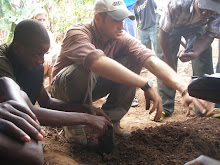Today I met my host organization the Liberty
Development Foundation (LIDEFO) Uganda. This
organization was founded in 2002 by a group of men and women from the Kasese Municipal Council as a community based organization focused on education and
vocational training for members of the community. Beekeeping is just one small part of the
organizations training programs; they are working with women and at risk youth
in starting microenterprises. They also
offer professional classes through Liberty College in journalism, tourism,
hotel management, accounting, early childhood development, business, and
apparently much more.
One of the founders Mr. Daniel Ngangasi is the
director of the organization. Paitence
and I met with Mr. Ngangasi in his office to talk about the program for the
next couple weeks. He brought in his
Beekeeping managers Simon the beekeeping field officer, and Jockous the honey
processing center manager. They were all
extremely welcoming and patient answering all of my questions. They were also over the moon excited about
the honey harvesting equipment and protective gear that was donated. Thanks again to everybody that made that
happen.
Their current honey processing facilities are
extremely cramped and certainly won’t suffice for increased production, but Daniel
explained that they are already in the process of building a honey-processing
center where they can really expand. I
asked if I could go and see it not realizing that it was all the way on the
other side of town. But everybody gladly
obliged, and we all loaded up in the CNFA truck for a field trip. The building was much bigger, and it can also
accommodate a selling shop. Daniel
explained that the building next door will also be a teaching facility and the
land behind the buildings will be used for a demonstration apiary. I can see Simon and Jockus leading regular
workshops there someday.
Then we loaded up in the truck to go visit some
shops in town that are currently selling LIDEFO honey. I asked one of the vendors if people buy
it. She said that it was the best
selling honey they have. Granted it was
the least expensive, but she said that people also bought it because they new
it was local. The other honeys on the
self were from Kenya, the United Arab Emirates, and two other ones from
different regions in Uganda.
Next we went to Daniel’s wife Grace’s shop. She also sells a lot of honey here, but more
importantly this is the honey drop off center for farmers. It was the perfect site for it because it is
centrally located in the heart of town with a bus stage right next to it, so
farmers can drop off their honey when they go into town to visit the
shops. It’s also ideal because she
always has cash on hand from the shop’s sales, so she can pay the farmer
immediately upon receiving the honey.
This a great system, because most small honey packers can’t pay their
farmers until long after they have sold the honey, so they have to sign
confusing contracts that leave the farmers unsatisfied. In the evening the buckets of honey are
picked up from Grace’s shop and brought over to the honey-processing
center.
I think the LIDEFO is off to a great start. I hope that the next two weeks trainings will
encourage the farmers to expand their apiaries and start harvesting only capped
honey for sale at the LIDEFO. I also
think we can figure out ways to better preserve a quality product throughout
the packing process. I think LIDEFO is
doing a great thing in starting a honey packing business because they are
providing a consistent market for the rural beekeepers of the area, while also
reinvesting the enterprise’s profits into community projects. I hope that as their business grows it can
become a model for other community-based organizations to follow. I also love that this was a community-started
organization, and that it is still and always will be locally run. They also have a great website for more
information: www.lidefo.org








No comments:
Post a Comment